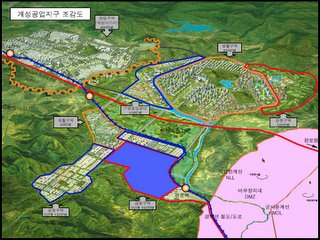U.S. Considering Devastating Financial Sanctions Against N. Korea; Kaesong May Be the First Casualty
Long-time readers of this blog know that for nearly two years, I’ve advocated aggressive economic measures against the North Korean regime that would force international finance to choose between doing business in the North and in the United States. Such sanctions would wring the most knowledgeable and best-financed investors out of North Korea until it made signficant and irreversible steps toward comporting itself with the rules by which humanity lives.
Until now, the Bush Administration has failed to take strong-yet-practical actions in the face of Kim Jong Il’s blithe recalcitrance and unabated brutality. After more than a decade of U.S., South Korean, Japanese, and Chinese diplomacy, Kim still isn’t negotiating in good faith.
That’s why it’s so gratifying to read this story. It reports that the White House is considering an executive order that would deny any financial institution doing business with North Korea the right to operate inside the United States:
The U.S. is readying fresh sanctions against North Korea over the regime’s alleged financial crimes that will be significantly more severe than the ones already in place. Raphael Perl, a congressional researcher in charge of tracking Pyongyang’s drug dealings and counterfeiting, said Friday authorities completed a rough draft of an executive order that would stop any financial firms involved in transactions with North Korea from conducting business in the U.S.
That will mean all banks, brokerage houses and insurance firms and refers not only to illegal transactions but to any financial deals with the North, Perl told the Chosun Ilbo on the phone. Once the regulations are finalized, “the message to financial institutions operating in the U.S. will be that the time has come for them to choose between the U.S. or North Korea,” he added.
 What goes unmentioned in this article is the likely effect this will have on the Kaesong Industrial Park, South Korea’s plan to enrich itself by shifting from feisty, unionized South Korean labor to cowed North Koreans who’ll take $57.50 a month and (pretend to) like it, minus “voluntary” payments to the North Korean regime, of course. (In what must be the ultimate sign of South Korean labor unions’ capitulation of their constituents’ interests to the enrichment of Kim Jong Il, the South’s big unions have yet to raise a peep about the export of union jobs, or to question the safety of working conditions or the sufficiency of the wages under which their Northern brothers labor).
What goes unmentioned in this article is the likely effect this will have on the Kaesong Industrial Park, South Korea’s plan to enrich itself by shifting from feisty, unionized South Korean labor to cowed North Koreans who’ll take $57.50 a month and (pretend to) like it, minus “voluntary” payments to the North Korean regime, of course. (In what must be the ultimate sign of South Korean labor unions’ capitulation of their constituents’ interests to the enrichment of Kim Jong Il, the South’s big unions have yet to raise a peep about the export of union jobs, or to question the safety of working conditions or the sufficiency of the wages under which their Northern brothers labor).
[U]nder the draft order, almost all finance companies would be effectively prohibited from doing business with North Korea. That would also affect international financial institutions outside the U.S. and thus deal a heavy blow to North Korea’s overseas trade.
In Perl’s reading, financial institutions would have a choice whether they are with or against the U.S., but given the importance of their U.S. interests, it would in effect force most major international firms to stop dealing with the North.
I have one very modest kvetch. This exec order is tied to counterfeiting, certainly a grave concern and a legitimate interest of this country, but less grave a concern (at least, to me) than millions dying in man-made famines–including the one that may yet happen because the North kicked out the World Food Program–and hundreds of thousands in concentration camps. My own proposal (the draft text is here) would have tied the financial disincentive to the sale or use of the products of forced labor, which is probably the foundation of the North’s oppression of its own people. It would also have the advantage of compensating the victims, creating an incentive for defections, and using the incentive of attorney fees to attract aggressive lawyers into what could prove to be a litigation quagmire for any company that invests in the North.
Nonetheless, this move is an excellent start, one that could signal a new hard-headedness in Washington. And although the South Korean government is sure to complain–no matter the legitimacy of the U.S. interest–it’s sufficiently justified when the U.S. has enough proof of what North Korea is doing to bring criminal cases to trial.
And of course, I make no personal secret of my desire for ending Kim Jong Il’s reign, and ultimately for uniting the Koreas under democratic rule (although plenty of other Americans do make a secret of it, perhaps for good diplomatic reasons). This alone will not drive Kim Jong Il from power, but it will do severe damage to North Korea’s remaining foreign income, most of it from arms sales or illegal trade. To do that, it’s not necessary to drive all foreign capital out of North Korea; it’s only necessary to prevent any significant influx. Pyongyang’s own greed, paranoia, arbitrariness, and inefficiency will do the rest.